- Home
- Allan Topol
Russian Resurgence Page 7
Russian Resurgence Read online
Page 7
At the end, Betty removed her coke-bottle glasses and twirled them slowly between her fingers, her face pensive. “That’s quite a story,” she eventually remarked. “Whatever operation Peter and Emma were planning must have been significant enough to get them both murdered.”
“Exactly my conclusion. Do you think that Peter, with Emma’s help, was planning to overthrow Szabo and launch a revolution in Hungary?”
Betty thought about it for a minute. “The Potomac fire was too sophisticated to be the work of Hungarian intelligence agents. Also, I doubt if they would go into Paris and torture Emma Miller that way. Perhaps I spent too much time in the last two days talking about Kuznov and Russia, but to me this has Kuznov’s fingerprints all over it.”
Elizabeth nodded. “You’re right on the mark. A source in the French Foreign Ministry told me that Emma’s killers may have been Russian. But what I can’t figure out is why Kuznov would even be involved.”
Betty shrugged. “I don’t know. All we have to go on is the note Peter gave Nick for Emma. The two of them were planning some type of operation. Would it have adversely affected Kuznov? Did the Russian leader find out about it? I’m grasping at straws because we have nothing else. Perhaps if we had a clear understanding of Peter and his life we might be able to come up with answers.”
“I’m flying to Budapest tomorrow to meet with Gyorgy Kovacs, Peter’s business associate who is based in Hungary. He may be able to supply critical background information about Peter.”
Betty’s face lit up. “That could be an enormous help. My instinct tells me that understanding Peter Toth is the key to unlocking who perpetrated the Potomac fire and Emma’s murder. When I get back to Washington I’ll talk to Chris Murphy, the FBI director, and have him put the FBI on the Potomac fire investigation.”
Elizabeth was concerned. “Please don’t tell Chris about Nick. The kid’s life is in danger, and I’m so worried about him.”
“If you don’t want me to, I won’t.”
“Thank you.”
“That’s all right, but Elizabeth, I’m surprised you’re so emotionally involved with this kid.”
“I don’t know what it is. I have eleven nieces and nephews, but I’ve never seen a kid like Nick. He’s so stoic and resourceful. After all he’s been through . . . he really is amazing.”
“What’s Craig say about Nick?” Betty asked.
“He only saw him briefly before he flew off to Tel Aviv.”
“To race?”
Elizabeth explained about the murder of Amos Neir.
“Do the French know Amos was Mossad?” Betty asked.
“I don’t think so. I have a feeling Craig and Giuseppe will let them know when Craig comes back.”
“Jean-Claude will go through the roof.”
Elizabeth was alarmed. “You won’t tell him, will you?”
“Of course not. I’m a lot of things, but not a masochist. Craig and Giuseppe can step in front of that chainsaw.”
As Elizabeth stood and thanked Betty again for stopping in Paris Betty said, “One other thing. I just recalled something from our Berlin meeting that could be useful to you.”
“What’s that?”
“How much do you know about Franz Szabo, the current Hungarian prime minister?”
“Henri, the publisher of my paper, described him as a horror, a right-wing demagogue, and vicious.”
“Henri’s spot on. Szabo is constantly moving to the right and quashing civil liberties. He’s been doing his darndest to convert Hungary into a dictatorship. Add to that one other fact I just learned in Berlin: We’ve received reliable information that Szabo is making a strong pivot toward Russia. He’s negotiating a trade deal with Kuznov for the supply of nuclear energy. That’s upsetting England, France, and Germany, who are sure there must be a quid pro quo.”
“I’m glad to hear the three of them agree on something.”
“Kuznov doesn’t care. He’s playing by Moscow rules. Do you know what those are?”
Elizabeth shook her head.
“The rules that Kuznov makes up as he goes along. And they generally involve the use of force. So Kuznov and Szabo getting together, if it were to happen, is a nightmare scenario, not merely for Europe, but for the United States as well.”
Elizabeth mulled over Betty’s words as she left the embassy and made her way back to the car. As she opened the car door, her phone rang. It was Pierre.
“I left one of my colleagues at your apartment,” he reported. “He said that somebody in a black Citroën pulled up, parked in front of your building, and was waiting. He looked suspicious, so my colleague walked over and flashed a Paris police ID. When he saw it, the man drove away.”
Elizabeth was startled. They must know she had had contact with Nick. Hopefully they didn’t know where she had taken him.
“Listen, Pierre,” she said, “can you have one of your men go up to the clinic where we took the boy this morning and stand guard there?”
“Will do, but what about you? Do you still want to stay in your apartment tonight?”
“Damn right. Let ’em come. We’ll be waiting for them. You okay with that?”
“For sure. That’s what I get paid to do.”
Moscow
Kuznov had constructed a private gym next to his Kremlin office. Aides knew that when he was working out he didn’t like to be disturbed. It had to be for something extremely important. So as he pedaled furiously on the stationary bike, the Russian president was surprised to see Dimitri walk into the room and approach him.
Perspiring heavily, Kuznov reduced his pace. “What happened with Szabo? Did he agree to my terms?”
“I haven’t gone yet. I’m flying to Budapest this evening.”
Kuznov stopped pedaling and grabbed his water bottle, chugging greedily. His face was red from the workout and from anger. He told Dimitri, “You disappoint me that you haven’t already fixed this with Szabo. It was your top priority. What could have been more important?”
Dimitri looked chagrined. “Believe me, I was ready to go immediately after our last meeting, but Szabo claimed to be too busy to see me until tomorrow morning.”
“It’s all an act. Fucking Hungarian. He’s playing you like a violin. Once this agreement is implemented and I don’t need him anymore, he’s a dead man.”
Dimitri took a deep breath. “I have some more news you won’t like.”
Kuznov gripped the bike to steady himself. “Tell me.”
“Boris, who was responsible for the Emma Miller assignment in Paris, just got back to Moscow and gave me a report.”
“I saw the news stories about her death.”
“She wouldn’t tell them anything about Peter Toth’s plans to wreck the Friendship Pact—even after extreme interrogation.”
“Then they didn’t do a good job,” Kuznov spat. “I never failed.”
“But there’s another problem Boris told me about. At the time the two men went into Emma Miller’s apartment, they left a third man, Anatol, in a car parked close to the building. Anatol remained in place even when the other two left the area. After Emma’s body was taken away, Anatol saw a frightened boy, age about ten to twelve, get out of a cab and hide behind a car. When the police had gone, the boy approached the reporter Elizabeth Crowder.”
“From the International Herald?”
“Exactly. She took the boy away.”
“How did Anatol know it was Elizabeth Crowder?”
“He lives in Paris,” Dimitri explained. “Sometimes she’s on the television. He recognized her.”
Kuznov pounded his fist on the side of the bike. “What a moron. Why didn’t Anatol snatch the boy before Elizabeth could take him away?”
“That’s what I said. Boris told me that Anatol wouldn’t do anything like that unless he had specific orders.”
“Is he a man or a fucking robot?”
“Boris also told me that Anatol was able to take a covert picture of the boy before he got into
Elizabeth’s car. I immediately sent it to our people. On a hunch, I ordered them to locate photos of Peter Toth’s grandson, Nicholas Toth, to see if it matched up.”
Kuznov jumped off the bike, fuming. “How could those idiots in Washington have let the boy escape?”
“Maybe he wasn’t even at home at the time,” Dimitri suggested. “At any rate, let’s wait until we get confirmation that it’s Nicholas Toth.”
Kuznov looked irate. “I’m not waiting for anything. Of course the kid’s Toth. He has to be. This could be a good opportunity. He lived with his grandfather. We should seize him. He may have overheard what his grandfather was planning—the information we couldn’t get from Emma Miller. After that, they can kill him. We can’t leave a kid out there who could endanger our plans for the Friendship Pact. I want you to tell Boris to get his ass on the first plane to Paris and find that kid. I assume that Anatol and the rest of his team are still in Paris?”
“Correct.”
“Good. Then Boris can order them to move on Elizabeth Crowder’s apartment first. Nicholas Toth might be there. I want that kid.”
Tel Aviv
When Craig arrived at the unmarked, heavily fortified building in northern Tel Aviv that served as Mossad headquarters, an attractive young woman in a fitted khaki skirt led him to a private dining room on the top floor with a view of the Mediterranean. A gorgeous red fireball sun was setting across the shimmering water. He noticed the table was set for three.
A few minutes later, Moshe entered the room accompanied by a man Craig didn’t know.
“Craig, meet Gideon Baruch, my head of operations,” he said.
Baruch was a tall, tough-looking man in his forties. He had short brown hair, and a layer of coarse stubble blanketed his face.
Craig stuck out his hand. “Pleased to meet you.”
Baruch squeezed Craig’s hand so firmly it sent shock waves all the way up to his shoulder. I’m glad we’re on the same side, Craig thought.
“Let me tell you, Gideon,” Moshe said, “Craig Page is a unique intelligence asset. After God made him, he threw away the mold. Now he’s a race car driver. Do you know why?”
Gideon shook his head.
“I’ll tell you why. Because he refused to take crap from anybody in authority. He’s the only man to be fired as both director of the CIA and head of EU Counterterrorism. Are there any other jobs you’ve been sacked from Craig?” Moshe asked.
“Head of Mideast operations for the CIA,” Craig replied promptly. “That was before I became director. Let’s just say I don’t suffer fools very well.”
“I thought there were only wise men in Washington,” Moshe retorted.
“Yeah. Right.”
“I’m honored to meet you,” Gideon said.
“Don’t say stuff like that,” Moshe responded. “Page’s head is already large enough.”
Craig laughed. As they sat down, two waiters entered carrying trays. One held salads; the other grilled fish. The wine on the table was a cabernet from the Golan. After taking a bite, Craig commented on how excellent the fish was.
“It was caught this morning,” Moshe replied. “Gourmet experts always criticize our food. They say we can’t cook like the French or Italians. Of course we can’t. We’re not French or Italian. We have to forget about outside criticism and do what we have to do. I don’t just mean in food. We have to do what’s right for us in foreign affairs as well. This is a circuitous way of getting to Amos Neir.”
Moshe’s words were too nebulous for Craig to understand, but he didn’t ask for clarification. He expected to find out before long.
“It was good of you to come today,” Moshe added.
“Giuseppe asked me to do it.”
“No, I mean to the kibbutz this morning. It meant a lot to Daphna. You didn’t have to do that.”
“When my wife was still alive we spent a lot of time there with Daphna and Amos. Our daughters became good friends. Francesca loved the kibbutz.” Even now Craig found it difficult to talk about his daughter.
“I was truly sorry to hear about Francesca’s death,” Moshe said. “I’m devastated every time I bury one of my agents—but a child. I can’t imagine.” Moshe gave a deep sigh.
“Well,” he continued after a moment, shifting the topic with his usual brusque, businesslike tone, “let’s talk about Amos Neir. What does Giuseppe want to know?”
“One of your Mossad agents was killed in Paris and pulled from the Seine. As the head of EU Counterterrorism, Giuseppe assumes it was the work of terrorists. Not surprisingly, he wants to know who they are and what they’re up to. You can’t argue with that.”
“Of course not.”
“His first question is whether Amos was still with the Mossad. This morning I learned the answer is yes. So the next one is: What was he doing in Paris?”
When neither Moshe nor Gideon replied, Craig added, “Obviously he wasn’t on vacation with Daphna.”
They still didn’t respond. Craig pressed ahead. “Listen, Moshe, I know you like to play your cards close to your vest. I understand that. You have enemies the French don’t, and you want to pursue them. However, in a couple of days Jean-Claude, who fortunately happened to be in Turkey when this occurred, will return to Paris. He’ll connect the dots, learn that the deceased was a Mossad agent, and come pounding on your door. You’d be better off letting me and Giuseppe take the heat for you, or at least some of it. I also need to find out who killed Amos. I told Daphna I would do that.”
Moshe sighed deeply again. He does that well, Craig thought. Must have had lots of practice. Moshe pointed to Gideon. “Okay, tell him.”
Gideon took a sip of water, then said, “The commentators in the media love to go on at great length about the political rift between France and Israel. In the intelligence area, nothing could be further from the truth. Over the years we have developed and maintained a close and cooperative relationship with the French intelligence agencies. We consider them a valuable ally, and we have a great deal of respect for their organization and abilities. I believe they feel the same way about us.”
“However?” Craig prompted impatiently.
“The French police and intelligence agencies have their hands full worrying about attacks on their general population—in theaters, at soccer games and other sports events, and in restaurants, for example. We decided they need some help in stopping attacks aimed specifically against Jews and Israelis in France, particularly in Paris, where a myriad of those attacks occur every year.
“We figured that the French intelligence agencies could use help in infiltrating the Muslim communities in Paris. As you know, Amos’s parents moved to Paris after spending their entire lives in Morocco. He was born in Paris and lived there until he was fourteen, when his parents moved to Israel. With his dark skin and French language skills, Amos was able to move into Clichy-sous-Bois, a primarily Muslim suburb of Paris that is home to a significant number of jihadists. Blending into that community, for the last six months he was operating as an undercover agent, posing as a Moroccan businessman named Ahmed Hussein. His assignment was to end next month.”
“Daphna told me it was his last assignment before retirement.”
“Correct,” Moshe confirmed with sadness.
“Do you have any other agents in Paris doing this same work?”
“No, he was the only one we sent,” Gideon responded. “It was a trial assignment. If it worked out, we planned to send others later in the year. Before his death, Amos discovered three planned terrorist attacks, not aimed particularly at Jews, but at Paris targets—the opera, the French Open tennis tournament, and the Louvre during a Bastille Day celebration. Each time he alerted the authorities anonymously, and all were stopped. No announcement was ever made in the media. But the bottom line is this: Amos Neir saved scores if not hundreds of French lives.”
Craig was digesting what he had just heard. “So it’s likely the jihadists found out what Amos was doing and killed him.”
“That’s what we figure,” Gideon said. “Amos was strangled, then dumped into the river. According to Paris police, they received an anonymous call from someone who saw a body being tossed from a car into the Seine.”
“So Amos’s assassin could be any of the jihadists in Paris, and there are quite a few of them.”
“We think we can narrow the field to one leading suspect.”
“That would be helpful.”
Gideon pulled a laptop from his briefcase. He showed the screen to Craig, where he had brought up a photo depicting a bearded man.
Craig didn’t recognize him. “Who is he?”
“Omar Basayev, known as Omar the Chechen. A week ago Amos informed us that a man revered by the Chechens had arrived in Clichy and seemed to be engaged in suspicious activity. Amos sent his photo, and we made the ID. We were surprised Omar was in Paris because all of his activities to date have been aimed at Russia. We asked Amos to do surveillance on Omar. If we found out what he was doing in Paris and passed it on to Jean-Claude, it would earn us a lot of points with French intelligence.”
“What did Amos learn about Omar’s activities in Paris?” Craig asked.
“That he was recruiting young men for some type of terrorist attack,” said Gideon. “Unfortunately Amos wasn’t able to find out the target or the date. How much do you know about Omar?”
“I never had an assignment in Chechnya or one involving Chechens so my knowledge is limited,” Craig replied. “I heard Omar’s name mentioned a couple of times in intelligence briefings at Langley. That’s all.”
“Omar is both a fascinating and terrifying character,” Gideon said. “In order to understand him, I have first to give you some background about Chechnya. This rugged land in the Caucasus Mountains in Southern Russia is home to many Muslims who, for centuries, have been determined to resist Russian domination and control. This goes all the way back at least to Peter the Great, who sent troops in 1722 to subjugate them and failed. In the time since, the Russians moved in with cruel troops, aiming to suppress this unyielding region or else destroy every last Chechen, and they often suffered heavy losses as a result.

 Conspiracy
Conspiracy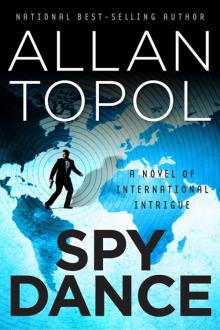 Spy Dance
Spy Dance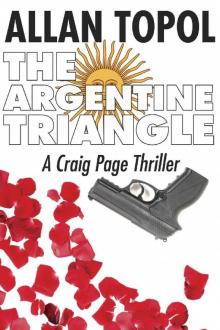 The Argentine Triangle: A Craig Page Thriller
The Argentine Triangle: A Craig Page Thriller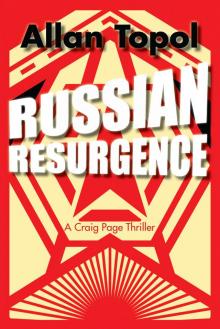 Russian Resurgence
Russian Resurgence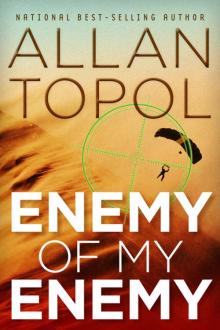 Enemy of My Enemy
Enemy of My Enemy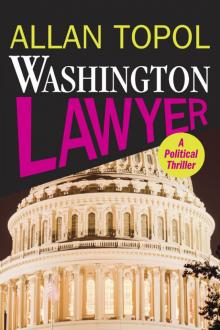 The Washington Lawyer
The Washington Lawyer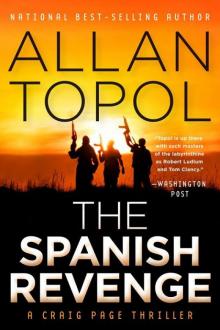 THE SPANISH REVENGE (Craig Page series)
THE SPANISH REVENGE (Craig Page series)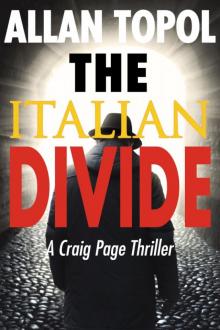 The Italian Divide
The Italian Divide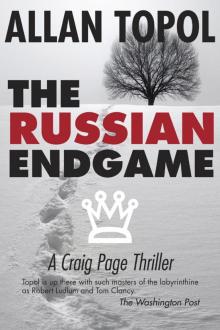 The Russian Endgame
The Russian Endgame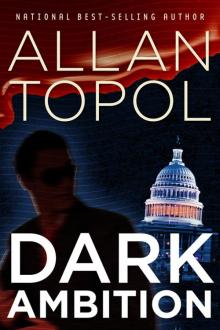 Dark Ambition
Dark Ambition